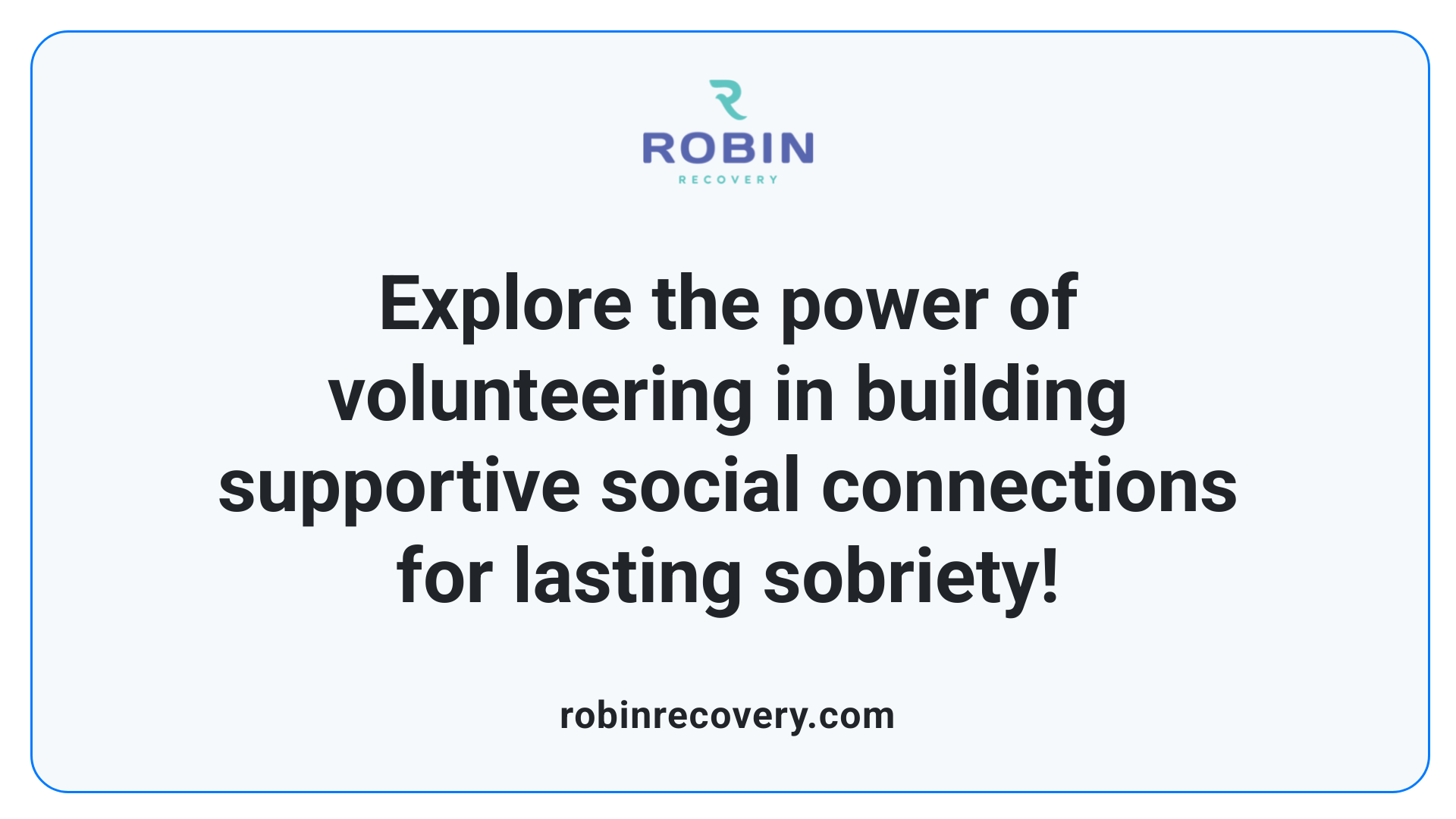The Benefits of Volunteering in Addiction Recovery

Introduction
Volunteering is increasingly recognized as a powerful ally in the journey of addiction recovery. Engaging in service activities offers myriad benefits that contribute to personal growth and sustained sobriety. This article delves into the multifaceted advantages of volunteering, uncovering how it supports mental well-being, prevents relapse, and builds social networks crucial for recovery.
Renewed Purpose and Self-Esteem

How does volunteering benefit individuals in addiction recovery?
Volunteering plays a significant role in aiding individuals on their journey to recovery from addiction. By engaging in service activities, individuals regain a sense of purpose that may have been lost during their struggle with substance use. This renewed sense of purpose is motivating, as it gives them daily goals and helps them align their actions with their recovery objectives.
Boost in Self-Esteem
One of the most important benefits of volunteering is the improvement in self-esteem. When individuals contribute their time and skills to help others, they begin to see the positive impact of their actions. This realization can be empowering and foster a stronger self-image, contrasting sharply with the self-centered behaviors often associated with addiction. Studies show that volunteering can increase life satisfaction significantly, with individuals reporting noticeable improvements in their mental well-being.
Contribution to Personal Growth
Moreover, the act of volunteering supports personal growth by introducing opportunities to acquire new skills and experiences. For instance, volunteering with organizations such as Citizens Advice can enhance employability, allowing individuals to practice existing skills while also learning new ones. Such experiences not only bolster confidence but also build resilience, which is crucial for maintaining sobriety.
In summary, volunteering facilitates meaningful connections and creates a supportive community, both vital components in preventing relapse. It encourages individuals to focus on contributing positively to society, enhancing their overall recovery experience.
Mental Health and Well-Being

What are the mental health benefits of volunteering during addiction recovery?
Volunteering during addiction recovery offers significant mental health benefits, such as reducing stress and improving self-esteem.
- Reduction in Stress: Engaging in volunteer work can significantly lower anxiety levels, with studies showing reductions by up to 4.3%. Helping others releases feel-good chemicals like dopamine, promoting calmness. Additionally, it provides a productive outlet, which helps in alleviating feelings of tension and stress arising from the recovery journey.
- Improved Self-Esteem: Participation in service activities provides individuals with a sense of accomplishment as they recognize the positive impact their contributions have on others. This increased self-worth is essential for regaining a healthy self-image, counteracting feelings of futility often experienced in addiction.
- Sense of Purpose: Volunteering instills a sense of purpose and belonging, helping individuals re-engage with society. By participating in meaningful activities, they develop a renewed focus on their recovery goals, contributing to their communities in significant ways.
Programs like Citizens Advice enhance this experience by offering training and support, allowing volunteers to acquire valuable skills for future employment. The diverse roles available cater to individual interests, ensuring that everyone feels valued and included. This sense of purpose not only uplifts spirits but also fosters personal growth, creating a supportive network vital for sustained recovery.
Structure and Relapse Prevention

In what ways can volunteering aid relapse prevention in addiction recovery?
Volunteering plays a significant role in preventing relapse during addiction recovery. By providing structured engagement, individuals can redirect their focus from self-centered behaviors to helping others, which is vital in overcoming the chaos often associated with addiction. This engagement also fills periods of unstructured time that could lead to triggers and potential relapse.
Structured engagement
Consistent participation in volunteer activities helps establish a routine, introducing important structure to daily life. When individuals in recovery engage regularly in community service, they develop accountability, as they commit to fulfilling responsibilities. This sense of duty diminishes feelings of aimlessness, keeping them focused on achieving their recovery goals.
Accountability and community
Being part of a volunteering community fosters a supportive network. Interacting with others who share similar objectives can counteract feelings of isolation, offering camaraderie and encouragement in recovery. This connection not only enhances social skills but also reinforces individual commitment to sobriety, as individuals hold each other accountable in their healing journeys.
Healthy routines
Volunteering is instrumental in cultivating healthy habits and routines. These new patterns provide stability, which can be crucial during recovery. Structured activities, whether mentoring, community cleanups, or working with shelters, not only keep individuals engaged but also help instill a sense of purpose, ultimately reducing the likelihood of relapse.
Building Social Connections

How does volunteering help build social connections in addiction recovery?
Volunteering plays a crucial role in building social connections for individuals in addiction recovery. It provides meaningful opportunities for individuals to engage with others who share similar experiences and challenges. This interaction is key to fostering supportive networks that counteract feelings of isolation often faced during recovery.
Participating in volunteer activities not only reinforces a sense of community but also promotes substance-free lifestyles. Through various engagements, such as community cleanups and mentorship programs, individuals connect in environments that encourage healthier relationships.
Moreover, assuming roles of responsibility while volunteering enhances one's resolve and accountability in their recovery journey. Mentorship roles can further solidify this commitment, as helping others often leads to a renewed sense of purpose and self-worth.
By engaging with recovery communities through volunteer work, individuals establish valuable social connections and create a support system vital for long-term sobriety. This sense of belonging is essential, as it helps individuals transition back into society, feeling valued and connected while reaffirming their commitment to recovery.
Practical Steps for Volunteering

What practical steps can one take to start volunteering in recovery-related opportunities?
To begin your volunteering journey, first focus on researching local organizations that center around addiction recovery. This includes rehabilitation centers, support groups, and non-profits dedicated to assisting individuals on the path to recovery.
Finding opportunities
Contact these organizations directly to inquire about available volunteer opportunities. Many are eager to welcome passionate supporters, making it easy to contribute your time and energy. You can also explore community boards or engage with local social media groups dedicated to addiction recovery; these venues often post about volunteering needs.
Engaging in volunteer work
Once you identify an opportunity, reach out to express your interest. To be a more effective volunteer, consider attending training sessions or workshops offered by these organizations. Such sessions provide valuable knowledge and skills relevant to the addiction recovery field.
Gaining relevant skills
Additionally, connecting with individuals who have experience within the recovery community can provide personal insights and helpful recommendations, guiding you on how to start volunteering effectively. This blend of research, training, and networking will help you find a fitting volunteer role that aligns with your goals while enhancing the recovery experience for yourself and others.
Volunteering as a Path to Self-Improvement
How does volunteering support personal growth during recovery?
Volunteering supports personal growth during recovery by allowing individuals to acquire new skills and experiences that are beneficial for their personal and professional development. This engagement provides a unique environment where individuals can practice existing skills while also learning new competencies.
- Skill Development:
- Volunteers have the chance to learn practical skills such as teamwork, communication, and problem-solving.
- Environments like shelters or community centers often need various types of assistance, enabling individuals to pick up technical skills in areas like administration or health services.
- Professional Growth:
- Many volunteer programs focus on specific areas, allowing individuals to gain experience relevant to their career aspirations.
- Networking opportunities through volunteering can lead to job offers or references, making the transition into stable employment smoother.
- Empowerment through Volunteering:
- Taking on volunteer responsibilities fosters a sense of accountability and ownership.
- Individuals feel a renewed sense of purpose, as volunteering links their efforts to real-world community needs, helping them recognize their value beyond past substance use.
Overall, volunteering not only enhances employability and self-esteem but also instills a sense of empowerment that encourages ongoing commitment to sobriety.
Conclusion
The journey of addiction recovery is multifaceted, involving substantial emotional, psychological, and social transitions. Volunteering emerges as a powerful tool through which individuals can navigate these changes, offering strength, purpose, and community support. As more individuals discover the transformative power of service, the benefits extend beyond personal recovery, contributing to the health and well-being of entire communities. Embracing the role of a volunteer not only aids in personal healing but also fosters shared resilience and hope, offering a beacon of positivity and progress in the recovery journey.
References
- The Benefits Of Volunteering In Addiction Recovery - Isaiah House
- Why to Volunteer in Sobriety | Ashley Addiction Treatment
- The Positive Effects of Volunteering During Addiction Recovery
- Research Shows the Many Physical and Mental Benefits You Can ...
- Why Volunteer Work Helps With Addiction Recovery
- Volunteering: A Powerful Tool in Long-Term Addiction Recovery ...
- Strength in Unity: Volunteering as a Catalyst for Purpose in Recovery
- 4 Reasons Volunteering Strengthens Your Recovery
- The Importance of Volunteering in Addiction Recovery
